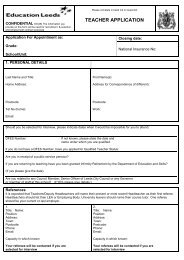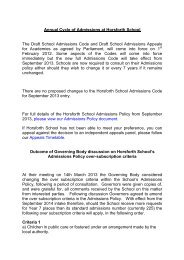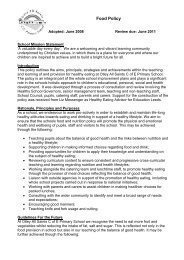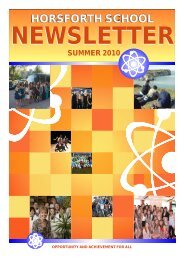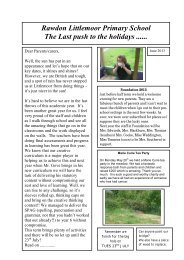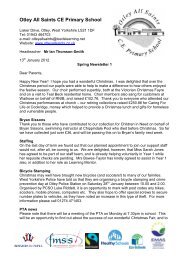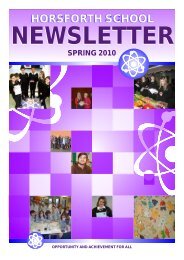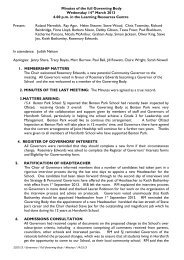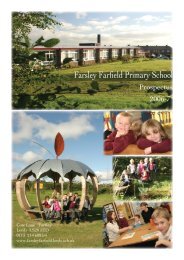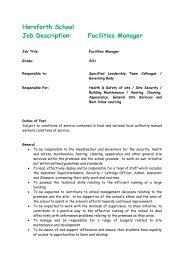POST-16 PROSPECTUS UPDATE SEP 11.cdr
POST-16 PROSPECTUS UPDATE SEP 11.cdr
POST-16 PROSPECTUS UPDATE SEP 11.cdr
You also want an ePaper? Increase the reach of your titles
YUMPU automatically turns print PDFs into web optimized ePapers that Google loves.
ENGLISH LANGUAGE<br />
Curriculum Leader: Mrs R Stokes<br />
Students will follow AQA GCE English Language Specification B in 4 units across the two years of Sixth Form<br />
study.<br />
Year 12 – AS<br />
Unit 1: Categorising Texts ENGB1<br />
In this first unit, which bridges the gap between GCSE and A Level study, students are introduced to the principles<br />
of Linguistics, which are not taught explicitly in years 7-11. They also learn about the analytical frameworks used<br />
in English Language study, applying them to both written and spoken language. This aspect of the unit is<br />
assessed by examination questions, which focus on students' ability to group, compare and closely analyse<br />
different types of written and spoken texts.<br />
The unit also focuses students' learning on how spoken and written language actually functions in the real world.<br />
Two topics are studied in Year 12: Language and Gender; Language and Power.<br />
60% AS / 30% A2<br />
Unit 2: Creating Texts ENGB2<br />
This unit is assessed by coursework. Students study stylistics including the work of a range of writers and<br />
different text types, and then produce two written pieces. These must be different types, for entirely separate<br />
purposes and audiences. Types of writing are drawn from a wide range of genres, with many students choosing<br />
to emulate ones which might be produced by a freelance professional writer. Students also have to produce<br />
'commentaries' which explain and justify their stylistic choices as writers. A flair for writing and being widely read<br />
in a wide range of fiction and non-fiction genres is essential.<br />
40%AS / 20% A2<br />
Summary of Assessment:<br />
Unit 1 assessed by examination; Unit 2 assessed by coursework.<br />
Year 13 – A2<br />
Unit 3: Developing Language ENGB3<br />
Two topics are studied in this unit. Language Change over time starts with the language of the prehistoric Britons<br />
and tracks the development of English right up to the ever changing language of the present day and the varied<br />
factors that influence and cause change.<br />
Language Acquisition teaches students about the development of children's speaking, reading and writing. As<br />
with previous units, both written and spoken language are covered and the examination requires students to<br />
apply their knowledge and skills to the analysis of a pack of data and texts relating to each of the two topics.<br />
30% A2<br />
Unit 4: Investigating Language ENGB4<br />
Also assessed by coursework, this unit gives students the exciting opportunity to undertake their own Linguistic<br />
Investigation. They begin by identifying a question they have about language, an observation they have made,<br />
or an area of interest they have developed. After background research has been done, students design their<br />
own investigation, collect and analyse data, draw conclusions using their linguistic knowledge and finally publish<br />
their findings.<br />
20% A2<br />
Summary of Assessment:<br />
Unit 3 assessed by examination; Unit 4 assessed by coursework.<br />
Additional Information:<br />
English Language encourages students to develop their interests in and enjoyment of English, through learning<br />
about its structures, functions, variations and development. It allows students to develop their ability to express<br />
themselves in speech and writing with increasing competence and sophistication. They encounter a varied<br />
range of reading and examples of spoken language and develop their skills in critical thinking and linguistic<br />
analysis.<br />
OPPORTUNITY AND ACHIEVEMENT FOR ALL<br />
14



